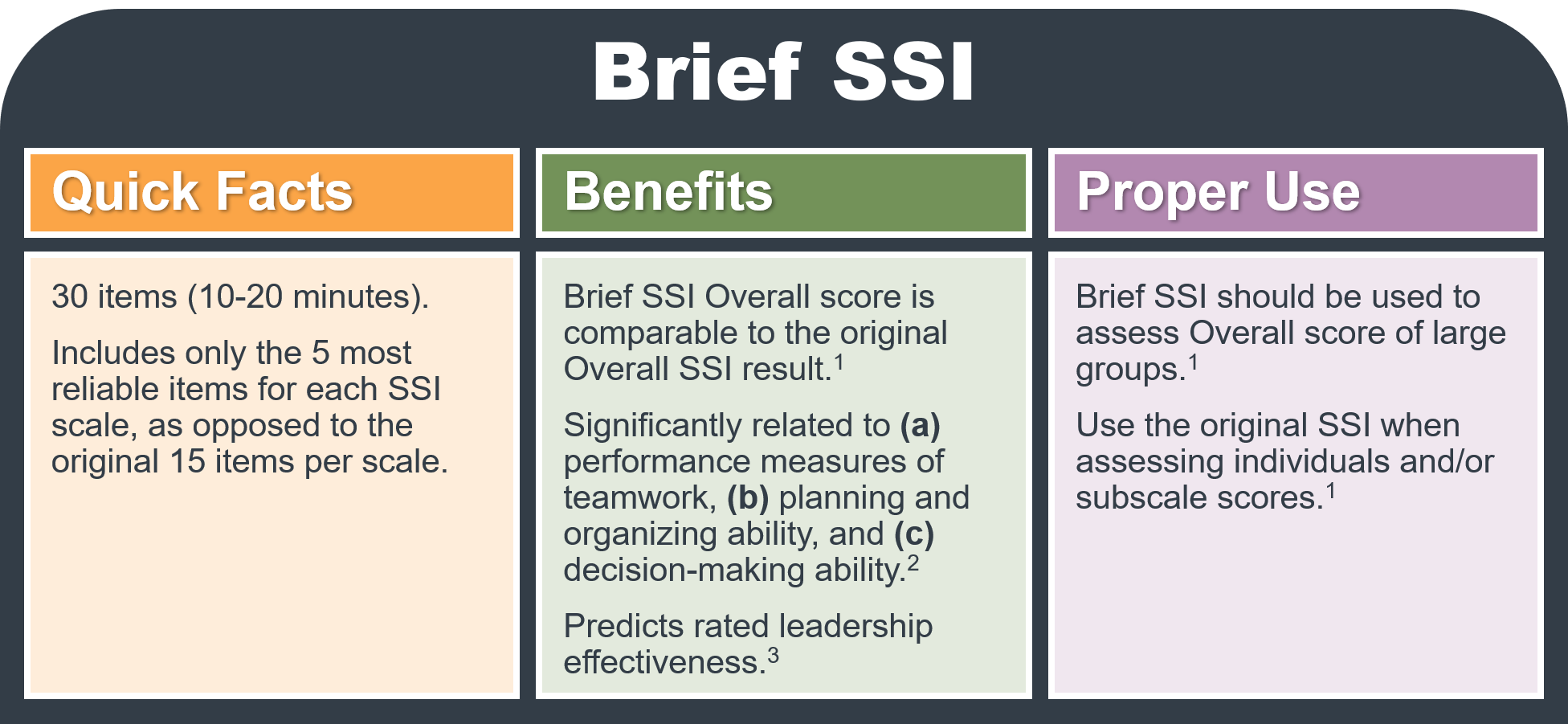Measure Social Competence with the Social Skills Inventory

Posted on 13 August 2018
by Issa Coultas
Humans are hard-wired to be social beings. Therefore, emotional and social skills are some of the most important skills we can possess. These skills represent the underlying mechanisms for initiating, maintaining, and growing good interpersonal relationships. Relationships that — according to research — influence our psychological health, physical health, and professional success.
Here are some ways research has shown that interpersonal relationships impact our lives:- Our identities are strongly influenced by our relationship with others — it is through interacting with others that we have a better understanding of ourselves, leading to better personal well-being.
- Positive relationships reduce psychological distress, while they increase autonomy, self-esteem, and self-efficacy.
- An inability to initiate and sustain constructive relationships with others can often lead to anxiety, depression, loneliness, frustration, and further isolation.
- High-quality relationships are associated with longevity, and to quicker recovery from illness and injury.
- The level of our social skills has also been shown to correlate with increased job opportunities, higher paying jobs, promotions, and generally higher ratings by our peers.
With all of these impacts, emotional and social skills are important to consider for personal and professional development. There are many assessments and workshops dedicated to measuring and developing emotional and social skills - but all too often they require formal training and large capital investments.
The Social Skills Inventory from Mind Garden (SSI, developed by Ronald Riggio 1989, 2003), is a cost-effective and easily administered self-assessment that measures basic social communication skill dimensions to interpret global social skills and social/emotional competence. The SSI does not require formal training or certification, and is priced for non-commercial users.
Also available from Mind Garden: Social Skills Training Guide
Design your own social skills workshop!
Social Skills Inventory Basics
Originally developed for use in personality and social psychology research, the SSI measures emotional and social communication skills as they relate to overall social competence. The SSI has become widely used in personnel selection, in clinical settings, and for training. More recently, it has been validated to measure Emotional Intelligence (EQ).
| Quick Facts about the SSI |
|---|
| 90-item (or 30-item) self-report measure, first introduced by Ronald Riggio in 1986 |
| Appropriate for individuals aged 14+ at 8th grade reading level or above |
| Six scales represent the possession of basic emotional and social communication skills, including expressive skills, sensitivity skills, and control skills. |
| Used to predict if an individual is likely to use socially skilled behavior in the classroom, on the job, in the laboratory, or in everyday social interaction. |
The SSI consists of six scales that measure communication skills on two dimensions - emotional (nonverbal) and social (verbal). Expressivity, sensitivity, and control are evaluated in each dimension. Expressivity refers to the skill with which individuals communicate or send messages to others; sensitivity refers to the skill with which they receive and interpret the communicated messages of others; and control refers to the skill with which they are able to regulate and manage the communication process.
The SSI also evaluates the balance of an individual's global social skill (Equilibrium Index). Possessing too much of any one basic component of social skill, relative to other key social skill components, may be dysfunctional. A high Equilibrium Index suggests good balance among the SSI dimensions and indicates higher global social skills/competence.
Emotional Expressivity (EE): measures skill with which individuals communicate nonverbally, particularly in sending emotional messages
Emotional Sensitivity (ES): measures skill in receiving and interpreting nonverbal communications from others
Emotional Control (EC): measures ability to control and regulate one’s own emotional and nonverbal displays
Social Expressivity (SE): measures skill in verbal expression and the ability to engage others in social discourse
Social Sensitivity (SS): measures ability to interpret verbal communication from others, and the individual's sensitivity to norms and understanding of the norms
Social Control (SC): measures skill in role-playing and social self-presentation, and ability to know how to act in a variety of social situations
| Contributions | Caveats |
|---|---|
| The SSI is a reliable self-report instrument. | As a self-report measure, three of the SSI scales may be subject to socially desirable effects. |
| The SSI is a valid self-report instrument. | SSI results should be treated as proposals regarding patterns of one’s communication behavior, not as infallible statements of fact. Present the results and ask for confirmation — the respondent should be the final arbiter of what constitutes valid descriptive results. |
| The Equilibrium Index (EI) gives an excellent overall indication of the consistency of one’s results on the six main SSI scales. | The respondent’s Overall SSI score needs to be considered in light of the EI because social skill is not purely an additive concept. |
| Interpreting individual scores relative to the published scale norms is an illustrative way to assess an individual’s social and emotional communication skills. | The SSI results should not be considered in isolation; rather, blend the results in with other sources of information, such as interview performance and work-simulation data, to arrive at a comprehensive portrait of communication behavior. |
| The SSI presents an easily understood model of key components of effective social and emotional communication functioning. | |
| The SSI is an easy and quick-to-use member of an assessment battery as an accurate indicator of social and interpersonal style, and of emotional intelligence. | |
| The SSI promotes self-awareness regarding personal functioning in six key areas, as well as understanding and appreciation of others' social and emotional functioning. | |
| A set of verified SSI results can help form the basis of action plans for personal performance improvement. |
Now Available from Mind Garden: the Brief Form of the SSI
In an effort to streamline social skill measurement, a shortened form of the SSI was developed in 2003 (Brief SSI). The Brief SSI is administered with the same instructions and under the same conditions as the original SSI. The Brief SSI is now available in your License to Reproduce and Remote Online Survey License purchase.

- References
- 1Riggio, R., & Carney, D. R. (2003). Social Skills Inventory Manual (2nd ed.). Redwood City, CA: Mind Garden Inc.
- 2Rubin, R. S., Carney, D. R., & Riggio, R. E. (2003). Screening for social skills: A psychometric evaluation of the Brief Social Skills Inventory. Manuscript submitted for publication. [Note: cited in Riggo and Carney (2003).]
- 3Groves, K. (2003). The contribution of leader emotional and social skills to leadership effectiveness during strategic organizational change. Leadership Review, 3. Retrieved from www.leadershipreview.org. [Note: Leadership Review is a discontinued online periodical, managed by the Kravis Leadership Institute.]
- See also: Groves, K. (2005). Gender differences in social and emotional skills and charismatic leadership. Journal of Leadership and Organizational Studies, 11(3), 30-46.
Uses of the SSI
The SSI has many uses including Emotional Intelligence measurement, leadership development, personnel selection, social and personality research, and counseling. Below are some examples of use.
Mayer and Salovey’s (1997) ability model of Emotional Intelligence (EQ) suggests that some components involve nonverbal or emotional communication skills. SSI’s three emotional scales directly relate to this key component of EQ. The SSI can be easily adjusted to be a brief, self-report measure of EQ by totalling the scores of Emotional Expressivity, Emotional Sensitivity, and Emotional Control.
Mayer, J. D., & Salovey, P. (1997). What is emotional intelligence? In P. Salovey & J. D. Sluyter (Eds.), Emotional Development and Emotional Intelligence (pp. 3-31). New York: Basic Books.
To learn more about EQ, visit our Emotional Intelligence Topic page.
As a research tool, the SSI has been most widely used to measure individual differences in communication skill/competence. Other research uses of the SSI include couples research, health psychology, and patient satisfaction and compliance.
Couples research: SSI scores are positively related to marriage quality and couples’ satisfaction with the relationship (DePaola & Riggio, 1988; Gibbs, DePaola, & Riggio, 1988; Burleson & Denton, 1997; Davis & Oathout, 1987). The SSI could be used in couples counseling to assess where couples differ in communication skills and then address these disparities to improve marriage quality and satisfaction.
Health Psychology: Some research has demonstrated that social skills moderate the relationship between social support and coping (see Cohen & Syme, 1985; Gottlieb, 1985; Heller & Swindle, 1983). Future areas of research should consider the relationship of social skills to social adjustment, perceived well-being, and sense of competence over the social environment and psychological health.
Patient Satisfaction and Compliance: Research has shown that physicians’ communication skills are correlated with patient satisfaction and compliance with treatment programs. (see DiMatteo & Friedman, 1982; Friedman, DiMatteo, & Taranta, 1980; Hall, Harrigan, & Rosenthal, 1995; Harrigan, Oxman, & Rosenthal, 1985).
- Burleson, B. R., & Denton, W. H. (1997). The relationship between communication skill and marital satisfaction: Some moderating effects. Journal of Marriage and the Family, 59, 884-902.
- Cohen, S., & Syme, S. L. (1985). Issues in the study and application of social support. In S. Cohen and S. L. Syme (Eds.), Social support and health (pp. 3-22). New York: Academic Press.
- Davis, M. H., & Oathout, H. A. (1987). Maintenance of satisfaction in romantic relationships: Empathy and relational competence. Journal of Personality and Social Psychology, 53, 397-410.
- DePaola, S., & Riggio, R. E. (1988). Social support, social skills, and adjustment in long-term marriages. Paper presented at the meeting of the Western Psychological Association, San Francisco, CA.
- DiMatteo, M. R., & Friedman, H. S. (1982). Social psychology and medicine. Cambridge, MA: Oelgeschlager, Gunn, & Hain.
- Friedman, H. S., DiMatteo, M. R., & Taranta, A. (1980). A study of the relationship between individual differences in nonverbal expressiveness and factors of personality and social interaction. Journal of Research in Personality, 14, 351-364.
- Gibbs, J., DePaola, S., & Riggio, R. E. (1988). Need compatibility, marital adjustment, and sex-role similarity in golden wedding couples. Paper presented at the meeting of the Western Psychological Association, San Francisco, CA.
- Gottlieb, B. H. (1985). Social support and the study of personal relationships. Journal of Social and Personal Relationships, 2, 351-375.
- Hall, J. A., Harrigan, J. A., & Rosenthal, R. (1995). Nonverbal behavior in clinician-patient interaction. Journal of Preventative Psychology, 4, 21-37.
- Harrigan, J. A., Oxman, T. F., & Rosenthal, R. (1985). Rapport expressed through nonverbal behavior. Journal of Nonverbal Behavior, 9, 95-110.
- Heller, K., & Swindle, R. (1983). Social networks, perceived social support, and coping with stress. In R. D. Felner, L. A. Jason, J. Moritsugu, & S. S. Farber (Eds.), Preventive psychology, research, and practice in community intervention. (pp. 87-103). New York: Pergamon Press.
- References
Assess social competence now! SSI Manual, Licenses, Reports, and Training Guide are available here.
SSI Manual SSI Individual Report Social Skills Training Guide

 SEARCH
SEARCH LOGIN
LOGIN  BLOG
BLOG
 CART
CART